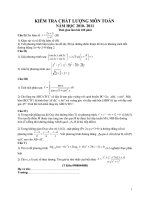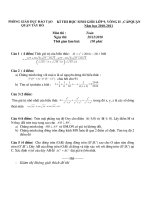Tài liệu ĐỀ THI LỚP 10 CHUYÊN CỦA SƯ PHẠM HÀ NỘI pptx
Bạn đang xem bản rút gọn của tài liệu. Xem và tải ngay bản đầy đủ của tài liệu tại đây (269.02 KB, 5 trang )
ĐỀ THI LỚP 10 CHUYÊN CỦA SƯ PHẠM HÀ NỘI
I Choose the best answer to complete each of the following sentences.
11. What a nice day ! Let’s go for a picnic, ___shall we______?
A. will we B. do you C. shall we D. don’t you
12. John gets good marks, _which_______ pleases his parents.
A. that B. which C. they D. it
13. The fewer bags you take, ____the less_____ trouble you will have en
route.
A. the fewer B. the little C. the less D. the least
14. This house needs __repainting________.
A. to repaint B. repainted C. to be repainting D. repainting
15. I have just bought ____a nice brown leather belt______.
A. a brown nice leather belt B. a nice leather brown belt C. brown a
leather nice belt D. a nice brown leather belt
16. Either I or John __has taken_______ the keys to the car.
A. has taken B. have taken C. has been taken D. have been taken
17. The doctor was attending ___to______ the sick
A. by B. to C. over D. with
18. Never put ___off______ till tomorrow what you can do today.
A. over B. off C. back D. away
19. ___Had we known______ your father was in hospital, we would have
gone to see him.
A. Had we known B. If we have known C. If we knew D. We had known
20. ____That leaves_____ turn color and fall to the ground is a sign of
winter.
A. That leaves B. Leaves C. When leaves D. If leaves
21. ___Hardly had we sat down______ at the table when the phone
rang.
A. Hardly we had sat down B. Hardly had we sat down
C. No sooner we had sat down D. No sooner had we sat down
22. Your friendly attitude makes ___it easier______ for you to socialize.
A. easier B. easier it C. it easier D. more easily
23. We’d better not waste water ____or else_____ we don’t have enough
to drink sooner or later.
A. only if B. or else C. as soon as D. in case
24. Only a few movies ____shown______ on this channel are suitable for
children.
A. show B. showing C. shown D. are shown
25. She was ____as patient a teacher____ as anyone could have had.
A. as patient teacher B. a patient a teacher C. as patient as teacher D. as
patient a teacher
II. Read the text below and look carefully at each line. If a line is
correct, put a tick by the number. on the separate answer sheet. If a line
has a word which should not be there, write the word on the separate
answer sheet. There are two examples at the beginning (0) and (00).
(1p)
LONDON
London is a big city, but many people who live there regard it as a
number of small towns put together. Each one district has its own identity
and atmosphere and some of parts are even described by their
inhabitants as ‘villages’. Much of the centre of the city consists of shops
and businesses and the majority of people they live in the suburbs. A
great many of them travel to work in the city every day bya train, bus,
tube or car; this is call commuting. Commuters might spend as much as
two hours every morning getting to work and too another two hours
getting home again. The cost of living in London is higher than soin most
other parts of Britain, and many people are paid extra money on the top
of their salaries because of this. Millions of visitors come to London
every year from all over the world for to see the famous sights, such as
Buckingham Palace, inwhere the Queen lives, and many other historic
buildings. London is also very famous for including its theatres, red
buses, and black taxis. Some people find it as a noisy, dirty place but it
has many large, pleasant parts where everyone can enjoythemselves some
peace and quiet. London has many attractions there, both for people from
overseas and for people from other parts of Britain.
III. Supply the correct tense or form of the verbs in brackets. (1p)
a. I (41. try) _have been trying_________ to learn by heart this text for
half an hour, but (42. not succeed) _have not succeeded________ yet.
b. He (43. fight) ___fought________ in Flanders in the First World War.
c. Though smoking (44. consider) _is considered_____ harmful to
people’s health, the number of its addicts (45. increase) _is
increasing_____.
d. Yesterday I (46. catch) __was/got caught_________ in the rain
because I (47. not watch) had not watched___________ the weather
forecast.
e. Snow White and the Seven Dwarfs (48. receive) __has
received_________ great excitement everywhere since it (49. first show)
__was first shown__________ in 1937.
f. The plane (50. take) _will have taken off_________ off by this time
tomorrow.
IV. Choose the word that best fits the blank space in the following
passage. (0.6 p)
Clothing habits are a matter of (1) ___B_____ preference in the United
States. Most people are free to wear (2) ____A____ they feel
comfortable. Business people in large urban areas are (3) ___B_____ to
wear suits or dresses, while clothing in rural area is less formal. Most
Americans tend to dress casually when not in formal or business
situations.
When eating, most Americans (4) ____C____ a folk in the hand with
which they write. Americans eat away from home often, and usually they
(5) _____D___ their own meals when dining with friends.
When Americans greet one another they often (6) ____B____ a firm
handshake. They may greet strangers on the street by saying “Hello” or
“Good morning”. Friends often greet each other (7) __with______
“How are you?” and respond “Fine, thanks”. Americans do not really
(8) __C______ any other answer to the question “How are you?”
because it is a way of saying hello. Except in formal situations, people
address each other by their given name once they are acquainted.
Although Americans are generally informal people, it would be (9)
____B____ to schedule an appointment before going to visit someone,
especially in business (10) _____D___ an appointment has been made, it
is considered to be prompt.
1. A. person B. personal C. persons D. personably
2. A. whatever B. wherever C. whenever D. whichever
3. A. unlikely B. likely C. like D. alike
4. A. take B. carry C. hold D. bring
5. A. buy B. get C. order D. pay
6. A. transfer B. exchange C. replace D. change
7. A. with B. of C. by D. about
8. A. want B. predict C. expect D. need
9. A. the best B. best C. good D. well
10. A. while B. during C. when D. once
V. Complete the text with a word that best fits each space. (1 p)
Cans made of steel are very easy to remove (0) __from_______ domestic
rubbish because steel is the only common metal that is attracted to
magnets. Many waste removal authorities have (1) ___taken______
advantage of this fact and have installed large magnets, which (2)
____to____ put it simply, put all steel containers out of the general
household rubbish. The system is known (3) ____as_____ ‘magnetic
extraction’ and it has two great advantages.
Firstly, unlike most recycling scheme, the recycling (4) ___of_____ steel
cans through ‘magnetic extraction’ requires almost (5) ____every_____
effort from the public. As long as you throw our used steel can into the
rubbish bin, it will be collected (6) ____and_____ then the waste removal
authority will (7) ___do______ the rest. Other packaging cannot be
recycled (8) ____so_____ the public collect the material and take (9)
___it/them______, usually by car, to a central collection point. This often
uses up more energy in petrol than (10) ____is_____ eventually saved by
recycling the material.
Secondly, local authorities actually save public money (11) ___by______
recovering used steel cans. Magnetic extraction equipment is simple and
cheap, and the steel that has (12) ____been_____ saved is sold to
companies who re-use it (13) ___for________ making new steel
products. (14) __Because_______ the value of the metal is greater than
the cost of magnetic extraction, the process has financial benefits.
So, magnetic recycling of steel cans from waste saves you time, effort and
money, as (15) well__ as saving energy for us all.









